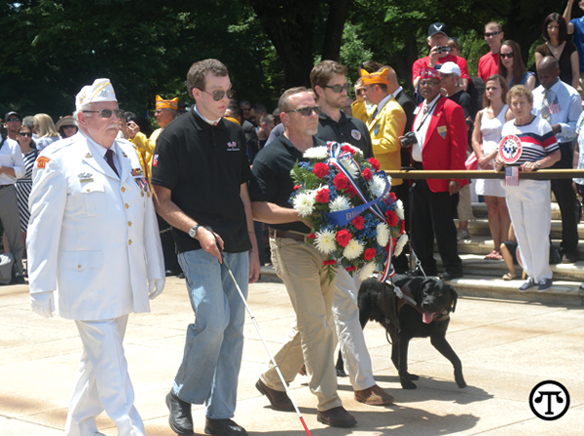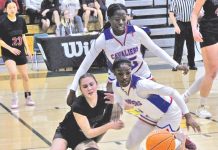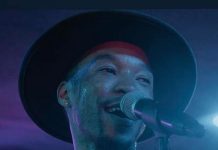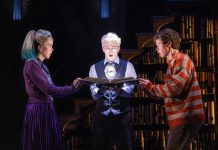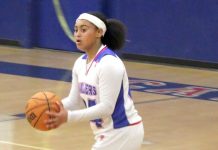(NAPS)—A look at one man’s story may inspire many people, veterans or not, to help others overcome difficulties such as blindness.
Consider the case of First Sergeant Danny Wallace (Ret.). He enlisted in the Army as an infantryman, completing one-stop training that included basic airborne school at Fort Benning, Georgia.
He served for a total of 20 years as a rifleman, radio transmitter operator, team leader, squad leader, ranger instructor, platoon sergeant, company executive officer, and company first sergeant.
(NAPS)—A look at one man’s story may inspire many people, veterans or not, to help others overcome difficulties such as blindness.
Consider the case of First Sergeant Danny Wallace (Ret.). He enlisted in the Army as an infantryman, completing one-stop training that included basic airborne school at Fort Benning, Georgia.
He served for a total of 20 years as a rifleman, radio transmitter operator, team leader, squad leader, ranger instructor, platoon sergeant, company executive officer, and company first sergeant.
During a tour in Iraq, Wallace’s life changed forever. Two weeks before Christmas, a car bomb attack in Tal Afar left him totally blind. After multiple surgeries—to attach both retinas, replace the cornea in his right eye, and stitch severe wounds to his face and neck—he was still blind in one eye but had limited vision in the other.
Wallace remained on active duty for two years after his injury. Upon retiring, he struggled with the transition to civilian life. “I felt distant and unwilling to participate in any veterans organization,” he recalled.
Finding Help
This isolation lasted about eight years. Then, he attended the Central Blind Rehabilitation Center at Edward Hines, Jr. VA Hospital just outside Chicago.
There, he found out about the Blinded Veterans Association, or BVA. Soon after that, BVA invited him to participate in its Operation Peer Support initiative. It connects combat-blinded veterans of World War II, Korea and Vietnam with the newly blinded who have been wounded in Iraq or Afghanistan. Operation Peer Support activities also provide informational seminars that touch on topics such as education, rehabilitation through sports and recreation, technology, and career development.
It helped Wallace rediscover purpose in his life and the experience had a ripple effect as he now serves as a BVA peer mentor for newly blinded veterans such as Mark Wilson, who lost his sight as a result of a gunshot wound to his face. Wilson’s mother says that meeting Wallace through BVA has literally “transformed” her son.
Over the past two years, Wallace’s eyesight has begun to decline even further. Nevertheless, he remains driven to serve. And he is once again a Sergeant, this time for BVA. “Early in 2014, I had the privilege to be selected as the Sergeant-at-Arms for the Blinded Veterans Association,” he explained. “Words cannot express how grateful I am. Now it is my turn to help other veterans feel that they belong as well.”
What BVA And Operation Peer Support Are All About
Founded in 1945 by a group of combat-blinded veterans of World War II, BVA was and is the only veterans service organization exclusively dedicated to serving America’s blind and visually impaired veterans. Membership is not a requirement to get help nor does vision loss have to have occurred during military service.
The organization also represents the interests of blinded veterans before the legislative and executive branches of government and encourages them to participate in VA blind rehabilitation programs and VA national sports events.
BVA counsels blinded veterans and links them with benefits, services and job opportunities. It also advocates for blinded veterans in the VA claims process.
Learn More
For further information about BVA, visit www.bva.org.


